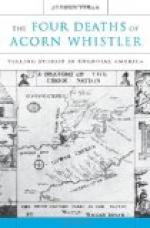* * * * *
A friend who was in court when the farthing damages verdict was brought in relates that Whistler looked puzzled for a moment; then his face cleared. “That’s a verdict for me, is it not?” he asked; and when his counsel said, “Yes, nominally,” Whistler replied, “Well, I suppose a verdict is a verdict.” Then he said, “It’s a great triumph; tell everybody it’s a great triumph.” When the listener dissented, he condensed all his concentrated scorn of Philistine view into a sentence: “My dear S., you are just fit to serve on a British jury.”
* * * * *
“Whistler vs. Ruskin” cost the latter so much more than the farthing verdict that his friends sent out a circular soliciting funds in these terms:
“Whistler vs. Ruskin. Mr. Ruskin’s costs.
“A considerable opinion prevailing that a lifelong, honest endeavor on the part of Mr. Ruskin to further the cause of Art should not be crowned by his being cast in costs to the amount of several hundreds of pounds, the Fine Art Society has agreed to set on foot a subscription to defray his expenses arising out of the late action of Whistler vs. Ruskin.
“Persons willing to co-operate will oblige by communicating with the Society, 148, New Bond Street, London.”
Mr. Whistler received scant sympathy, the tone of the comment being well noted by this excerpt from the London Standard of November 30th, 1878:
“Of course, Mr. Whistler has costs to pay too, and the amount he is to receive from Mr. Ruskin (one farthing), even if economically expended, will hardly go far to satisfy the claims of his legal advisers. But he has only to paint, or, as we believe he expresses it, ‘knock off,’ three or four ‘symphonies’ or ’harmonies’—or perhaps he might try his hand at a Set of Quadrilles in Peacock Blue?—and a week’s labor will set all square.”
Arthur Lumley, a New York illustrator, met Whistler once at a costume ball at George H. Boughton’s house in London. The artist appeared as Hamlet, but in anything but a melancholy mood. Next morning’s papers related that the sheriff had sold the effects in the White House the day of the ball to satisfy the claims of his creditors!
* * * * *
Isaac N. Ford, when correspondent of the New York Tribune in London, went with Frederick MacMonnies, the sculptor, to visit Whistler, who brought out a number of portraits for show. One was that of a woman, full figure.
“What do you think of her?” he asked.
The sculptor gave “a side glance and looked down.”
“Since you force me to speak,”, he finally blurted out, “I must tell you that one leg is longer than the other.”
Instead of the expected outburst, Whistler scrutinized the portrait from several points, and then observed quietly:
“You are quite right. I had not observed the fault, and I shall correct it in the morning.”




